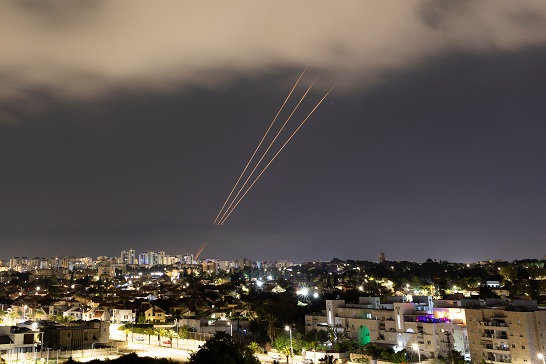Iran launched a wave of missiles and drones toward Israel late Saturday as regional tensions continued to mount over the war in Gaza.
President Biden condemned the attack and spoke with Israeli Prime Minister Benjamin Netanyahu to reiterate the United States’ “ironclad” commitment to Israeli security, the White House said.
Other allies including Germany, Canada, France and Britain reaffirmed their support for Israel in the wake of the attack while expressing fears that Tehran’s assault could further destabilize the Middle East.
Iranian state media said the missile and drone assault was in retaliation to a deadly Israeli strike on an Iranian diplomatic compound in Syria on April 1.
What happened
More than 300 drones, cruise missiles and ballistic missiles were launched by Iran in the first full-scale military attack on Israel by Tehran. Around 99 percent of the projectiles were intercepted, according to Rear Adm. Daniel Hagari, the Israel Defense Forces spokesman.
Some of the projectiles fell inside Israeli territory, and one damaged a military base in the country’s south, Hagari said. A young girl who was seriously injured in the attack underwent surgery and was moved to the pediatric intensive care unit, according to Israel’s Soroka Hospital.
Hagari said “a coalition” of countries helped Israel with intercepting the projectiles. The U.S. military helped Israel take down “nearly all” of the drones and missiles, Biden said. British Prime Minister Rishi Sunak said Britain’s Royal Air Force shot down “a number of Iranian attack drones,” while Jordan’s cabinet said it “dealt with” objects that flew through its airspace overnight. France also contributed technological support, Hagari said.
Israel’s war cabinet was expected to meet Sunday afternoon local time to discuss its response. The U.N. Security Council is expected to meet Sunday afternoon, Reuters reported, after Israel asked the council to condemn Tehran’s attack and designate the Iranian Revolutionary Guard Corps as a terrorist organization. Leaders of the Group of Seven are also expected to meet Sunday to discuss Iran’s attack against Israel.
Tehran’s attack on Saturday was “four-pronged,” according to a report by the state-run Tasnim News Agency, originating from sites in Iran, Lebanon, Iraq and Yemen. The commander of Iran’s Islamic Revolutionary Guard Corps, Maj. Gen. Hossein Salami, called Tehran’s attack “more successful than we had expected” and warned that any retaliation by Israel would draw a more forceful response.
Why did Iran attack Israel?
Iranian media said the attack was in retaliation for an Israeli strike this month on an Iranian consular building in Damascus, Syria, which killed members of the Islamic Revolutionary Guard Corps, including senior commander Mohammad Reza Zahedi and Brig. Gen. Mohammad Hadi Haj Rahimi.
Hamas expressed support for Iran’s attack on Israel this weekend, calling it a deserved response to the attack in Syria. Officials from the rebel Houthi group in Yemen congratulated Iran while downplaying their own involvement; Hagari said some UAVs and cruise missiles were launched from Yemen.
Israel has carried out strikes in Syria against Iran and its allies for years and throughout its six-month military campaign against Hamas in Gaza. But the April 1 attack stood out both because of its location — in a diplomatic compound, traditionally exempt from hostilities — and because of the seniority of the apparent targets.
Iran’s supreme leader, Ayatollah Ali Khamenei, promised that his country would avenge the Damascus attack. U.N. Secretary General António Guterres condemned the strike, citing “the inviolability of diplomatic and consular premises.”
What is the recent history between Iran and Israel?
Iran has funded attacks on Israel in the decades before Israel’s war in Gaza that began Oct. 7, and its proxies have stepped up strikes in the months since.
Hezbollah, an Iranian-backed Lebanon-based armed group, has been firing rockets into Israel since the start of the war. Iran also supports Houthi rebels by smuggling weapons to Yemen, allowing the Houthis to prolong a deadly campaign of violence against commercial shipping.
Israel and Iran have been waging a covert war of assassinations and sabotage for years, The Post has reported.
More recently, Iran accused Israel of killing Brig. Gen. Sayyed Razi Mousavi, a senior adviser to Iran’s Islamic Revolutionary Guard Corps, in a missile strike in Syria in December. Israel declined to comment on this accusation.
Israel’s main focus for attacks in Iran has been the country’s nuclear program, which Israel has tried to undermine for years, The Post reported.
In 2021 Iran blamed Israel for an electrical blackout at Iran’s nuclear facilities, and more than a decade ago when a computer virus targeted Iranian nuclear infrastructure, the malware was suspected to be developed by Israel and the United States.
Source: washingtonpost





